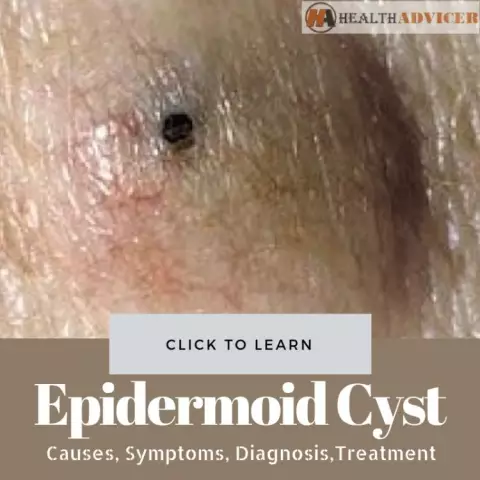- Author Rachel Wainwright wainwright@abchealthonline.com.
- Public 2023-12-15 07:39.
- Last modified 2025-11-02 20:14.
Follicular cyst

A follicular ovarian cyst is a benign hollow formation emanating from the largest (dominant) follicle in the absence of its rupture and release of the egg, i.e. ovulation. Follicular cyst is the most common form of all ovarian tumors. It never degenerates into a malignant tumor (does not become malignant).
The disease usually occurs in women of reproductive age, but very rarely a follicular cyst can occur in women in the early years of menopause, as well as in newborn girls.
Follicular cyst: causes
A follicular cyst occurs as a result of various hormonal disorders, i.e. due to neuroendocrine regulation of ovarian function. Hormonal imbalance in women can develop under the influence of the following reasons:
- Chronic stress
- Physical and mental overwork;
- Irregular sex life;
- Abortion;
- Poor nutrition;
- Gynecological operations;
- Childbirth.
When treating infertility, sometimes they resort to ovarian hyperstimulation, which can lead to the appearance of bilateral follicular cysts.
As we have already said, in newborn girls, a follicular cyst can also be observed, the cause of which is the excess of estrogen in the mother's body and its intrauterine effect on the fetus.
Follicular cysts are disappearing, i.e. are able to dissolve on their own, subject to the normalization of hormonal levels. If they persist for more than two menstrual cycles, then they are called persistent.
Follicular cyst: symptoms
In most patients, the main symptom of a follicular cyst is the appearance of a feeling of bloating or heaviness in the left or right side of the groin. As the cyst grows, pain appears, which increases with a sharp change in body position, intercourse, physical activity. As a rule, all these uncomfortable sensations occur in the second phase of the menstrual cycle, i.e. after the expected ovulation and about 14 days before the start of the next period.
Another symptom of a follicular cyst is a low basal temperature in the second phase of the menstrual cycle. Most often it does not exceed 36.8 degrees C. In addition, various disorders of the menstrual cycle are also a symptom of a follicular cyst.
Follicular cyst: complications
A follicular ovarian cyst can lead to the development of the following life-threatening complications for a woman:
- Torsion of the cyst. Occurs during physical exertion or intercourse. A woman has a sharp colicky pain in the lower abdomen, nausea and vomiting. Intestinal paresis develops very quickly, blood pressure drops, and tachycardia increases. If the follicular ovarian cyst is twisted, an emergency operation is necessary. With an untimely appeal for medical help, peritonitis develops, which makes the prognosis of the disease extremely serious.
- Rupture of the follicular ovarian cyst. At the moment of rupture of the cyst capsule, the woman feels a sharp sudden pain in the lower abdomen, as if she had been stabbed with a knife. Due to severe pain, the woman takes a forced bent position of the body. When a follicular cyst ruptures, internal bleeding occurs. Its symptoms are an increasing general weakness, pallor of the skin, a drop in blood pressure, an increase in tachycardia, the appearance of cold clammy sweat. Treatment of follicular cyst rupture is surgical. The operation is performed according to emergency indications.
Follicular cyst: treatment

Since the cause of the follicular cyst is hormonal imbalance, the treatment of this disease should begin with the normalization of hormonal levels. A woman is recommended to observe the daily regimen and eat right. If necessary, prescribe vitamins and minerals in tablets. If you are overweight, weight loss is recommended. Often, the loss of just a few kilograms of weight leads to the normalization of hormone levels, and the follicular cyst resolves itself. At the same time, the existing chronic diseases of the thyroid gland and digestive organs are being treated. If all these methods do not contribute to the resorption of the cyst, then the woman is referred to a gynecologist-endocrinologist for the appointment of hormone therapy.
Surgical treatment of a follicular cyst is performed only if the conservative therapy is ineffective, as well as if complications of the disease occur.
YouTube video related to the article:
The information is generalized and provided for informational purposes only. At the first sign of illness, see your doctor. Self-medication is hazardous to health!






